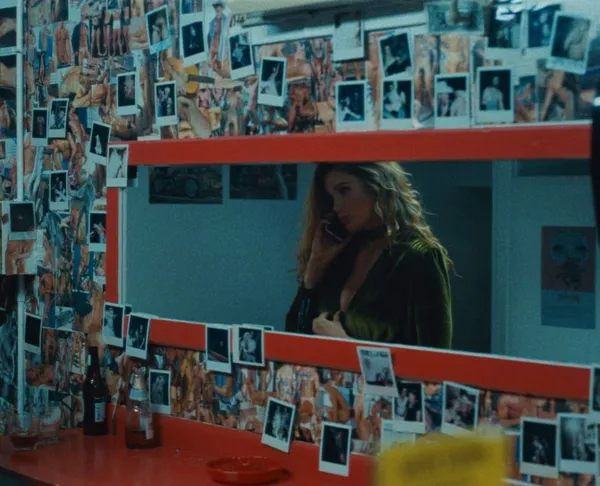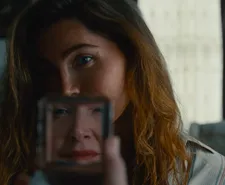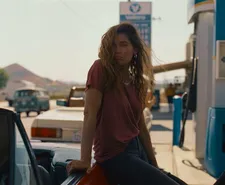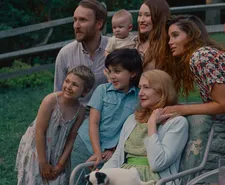 |
| Trace Lysette in Monica Photo: courtesy of IFC Films. An IFC Films release. |
In Andrea Pallaoro’s striking third feature, Monica, Trace Lysette plays the title character, a trans webcam performer, who returns home and tries to reconnect with her ailing mother, Eugenia (Patricia Clarkson). Continuing the director’s exploration of family and relationships in an effort to understand human nature, it refrains from offering answers, instead borrowing from Michelangelo Antonioni’s non-intrusive and observational approach, Pallaoro invites his audience to embrace and understand the fractured family at the heart of his film.
Lysette spoke with Eye For Film about the collaborative relationship she shared with Pallaoro, and the film’s contribution to conversations about representation for trans people.
 |
| Trace Lysette and Patricia Clarkson in Monica Photo: courtesy of IFC Films. An IFC Films release. |
Paul Risker: When you first read the script, what drew your interest in the character of Monica?
Trace Lysette: I received the script in December 2016 and the first thing I realised was this was a trans character at the centre of a feature film - the title role, which is rare. I thought, 'Well, let me read it and make sure it's non-exploitive and see if it's any good.’ So I kept reading it, but I realised right away that it was good, and that was enough for me to want to audition for it.
PR: We’re in this phase socially where we're trying to broaden representation by developing an understanding through rhetoric and empathy. What did you feel Andrea got right that was creating a shift in the right direction?
TL: One of the things that sticks out to me that I really enjoyed, and I'm grateful for, is that it's not overhanded and it doesn't feel preachy. It feels true to life and delicate. The way it relies on the audience, and everything is not spelled out for them, allows them to ask questions and think for themselves.
If it's all spelt out, then there's nothing to think about. When questions are asked, or you're left with questions at the end of a film, you're left thinking about it for days on end. Those are the pieces of art that stick with you, and some of the most beautiful films have those lingering thoughts.
 |
| Trace Lysette in Monica Photo: courtesy of IFC Films. An IFC Films release. |
I also think that helps it to be more digestible for the masses, because it starts a conversation with the audience that's not over the top, or preachy, for lack of a better word. It feels very fluid and delicate.
I feel representation is ever changing. It’s important that we continue to evolve and representation does too. I hope this is a film that we look back on in ten years and think, 'Wow, that's still a great film.’ I think it will start conversations and I hope people leave with an extra sense of empathy, or curiosity, and that it has a lasting impact.
PR: Unlike in theatre where actors have control over their performances, in film, you place your performance in the hands of the director and editor. Filmmakers have told me that a film is found in the final cut. From making the film to seeing it for the first time, how would you describe this experience?
TL: The script changed a lot from 2016 to when we started production. Then, even when we started production, it changed a little bit. I kept giving notes and I came on board as an executive producer. Even the first cut of the film was different from the last version of the script.
There were certain scenes I had to make my peace with that just didn't make it into the film. One I fought to get back in was the webcam scene, where she's turning a trick. It was a little glimpse of what she does for a living, and it's right before she goes to hold her mother, who's crying out. I just thought that contrast was powerful and beautiful.
 |
| Trace Lysette, Patricia Clarkson, Emily Browning, Joshua Close, Graham Caldwell and Ruby James Frase in Monica Photo: courtesy of IFC Films. An IFC Films release. |
At one point, Andrea felt it shouldn't have been in there, but after we had a discussion about it, he showed it to some more people and they were, “No, we've got to put this back in, it's important.”
Ultimately, I think we were both grateful that we had that conversation about it, but yeah, there were tonnes of changes along the way, and I learned a whole hell of a lot about indie film. I'm just grateful I had such a great director.
PR: From before to after the film, do you perceive there to be a transformational aspect where you change as a person?
TL: Absolutely, I think I change with every single job, and for the better I hope [laughs]. I'm always evolving, and there’s a quote that anything that's evolving is not dead. So I want to constantly be a student of life. Acting just happens to be my job and I feel so grateful.
Monica is in cinemas in the US from 12 May.





















